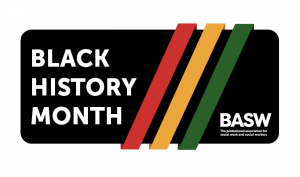‘It became clear that I have experienced racism’

Published by Professional Social Work magazine, 4 October, 2023
A new writing competition run by BASW’s Black and Ethnic Minority Professionals Symposium sought submissions from social workers on issues of race and colour. Winner of the inaugural competition was Tosin Sofowora, a MA social work student at the University of East Anglia. Her essay is reproduced in full and unedited below.
Reflective Essay on ‘Anti-racism in Social Work’ presentation by Pam Shodeinde 2021
Written by Tosin Sofowora (MA Social Work student)
Introduction
This essay is a reflection on the ‘Anti-racism in Social Work’ presentation by Pam Shodeinde. The presentation resonates with me both personally and in my practice as a social work student. As an international student with a background in law, I have, in my practice of law, advocated for social justice and the promotion of the rights of people. However, issues surrounding racism became very apparent to me when I moved to England. In this reflective essay, I will write about how the presentation resonates with me and how it has informed my social work practice during my first-level placement.
My Experience
Being the only international student in my class made me very conscious of my difference in so many ways. It also made me aware of the intersections existing even within black ethnic groups. For instance, although there were other black social work students in my class, my difference was exhibited in my accent (which is not ‘British’), my cultural background, my experience, beliefs and world view which have shaped my background. I never imagined that I would experience racism neither did I think I had experienced racism because I thought racism had to be some overt act of discrimination based on one’s difference. However, reflecting on the meaning of racism given in the presentation - “beliefs, attitudes and behaviours, institutional and systemic approaches that belittle and devalues a group based on the colour of their skin” makes it clear to me that I have (in fact) experienced racism. These racist acts are usually in the form of racial microaggressions, unconscious biases and stereotyping even if they come from a place of ignorance. For instance, a classmate, in a bid to sound or be empathetic, once expressed how difficult it must be for me to write in English since ‘English is not my first Language’. The misconceptions and unconscious biases I have experienced and witnessed have made me speak up to educate people about my culture. I have had to enlighten my white colleagues and correct certain notions and stereotypes they had. However, just as the presenter noted, the responsibility of educating should not be on the Person of Colour (PoC). When considering the four dimensions of racism from my experience, interpersonal racism applies the most.
My Social Work Placement Practice
My first-level placement was in a secondary school situated in an urban town. The school had about 950 students aged 11 years to 16 years who are predominately White-British with only about 5% of the students and staff from Black and Minority Ethnic (BME) groups. The approximately 200 staff of the school were also predominantly White-British with only about 0.5% of them from BME groups. The underrepresentation of BME staff in the school was very concerning to me because there was a massive opening up of the town to people and professionals of colour. I identified that within the school there were various support groups for students of minority groups like young carers, LGBTQ+ etc but no support group for BME group students. Meanwhile, I interacted with some black students particularly those who had just migrated to England, and they shared their struggles with me. Interestingly, I could relate to some of the struggles they shared with me. I identified the need for a support group for the BME group student and with the approval of the school authority, I created a BME group where I facilitated sessions with the BME students. The sessions aimed to acknowledge diversity and promote equality and inclusion within the school. It was also to create a safe place where the BME students could offload and get their wishes and feelings about their experiences in the school. During the session, we discussed issues around racism, bullying, prejudices, and biases against them and at the end of my placement, I presented a report to the school’s vice-principal and designated safeguarding officer where I summarised the voices of the BME students and made recommendations based on their wishes and feelings. The school promised to share my recommendations with the student council and consider the recommendations proffered.
The fact that the school lacked an awareness of the needs of the BME students or had no support group for BME students like other minority groups buttresses the school’s lack of awareness of cultural diversity and multicultural education. I also noticed that just like many social work organisations, there was no active stance on anti-racism. At best, the school operated a ‘non-racist’ posture without taking any practical steps to promote equality and inclusion. The school’s level of commitment to anti-racism is evidenced only through an equality statement published on its website. While this is a step in the right direction, the aim of the school, as demonstrated in the presentation should be to publish an anti-racism action plan that should be binding on all students and staff of the school.
Finally, my experience during my first level placement reinforces the presenter’s research on the underrepresentation of PoC in the use of early help or Family support services and the overrepresentation of PoC in social services involvement or Tier Four services without family support. I observed that BME students in school hardly made use of the pastoral support nor were they known to the safeguarding officers. In other words, BME students were underrepresented in accessing support within the school. No doubt, this could be because of some reasons: (i) the low number of BME students in the school; (ii) fear of reporting safeguarding concerns; (iii) lack of awareness of the support available; and (iv) no need for support.
Conclusion
This essay reflects on Pamela Shodeinde’s presentation titled ‘Anti-racism in Social Work’. The writer resonates with the topic in a personal and professional capacity and has shared how she has dealt with racism in her personal life and her social work practice as a student on placement.

